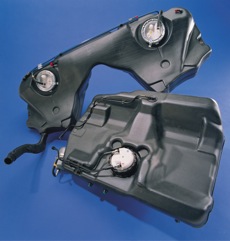LyondellBasell Industries has commercialized a family of newly patented Lupolen high density polyethylene (HDPE) resins that offer improved resistance to biodiesel and may therefore be of interest to manufacturers of automotive plastic fuel tanks.
 The new resin, addressed to the needs of fuel tank producers facing biobased product challenges, is available for use in blow molding (Lupolen 4261 AG BD) and injection molding (Lupolen 4261A IM BD) processes.
The new resin, addressed to the needs of fuel tank producers facing biobased product challenges, is available for use in blow molding (Lupolen 4261 AG BD) and injection molding (Lupolen 4261A IM BD) processes.
“With this new resin, we have improved chemical resistance that should allow manufacturers to produce fuel tanks that can accommodate fuels containing higher levels of biodiesel,” said Thomas Lindner, Technical Manager of LyondellBasell’s Automotive Fluid Systems Business.
Lupolen HDPE test data using blow molded and injection molded parts have shown a significant increase in chemical resistance to biodiesel fuels compared to current HDPE grades on the market. After 1,500 hours of contact with fuel consisting of 100 percent biodiesel, the grade changed its intrinsic viscosity by 1.7 percent, which corresponds to a nearly thirty-fold improvement in resistance compared to standard HDPE grades previously used by customers in fuel tank applications.
Physical properties maintained
“Of particular importance to customers is that with improved chemical resistance to biodiesel, Lupolen 4261 AG BD and Lupolen 4261A IM BD maintain their physical and chemical properties at the same level when compared to our conventional Lupolen 4261A product family,” said Lindner. “This also applies to the melt viscosity during processing, so previous molds and machinery are expected to require no modifications.”
Lindner added, “The effects of high biodiesel-content fuels on HDPE have not been recognized for many years because of the conventional test methods used. In our enhanced test method, fuels with high biodiesel-content are maintained in an HDPE container over a long period at elevated temperatures. Hence, the fuel and the HDPE are exposed to atmospheric oxygen and moisture and it was found that the combination of these can attack the HDPE. This can result in changes to the typical material properties of the polymer, which should be avoided from a crash performance point of view.”
LyondellBasell’s test method subjected fuel tank samples to temperatures of 40 degrees Celsius, with an exposure time of 11 years using 100 percent biodiesel samples.
EU Directive on biofuel
“Our new biodiesel grades will address automotive industry demands for resins that meet alternative fuel technology needs. The relevant EU Directive on the use of biofuels or other renewable fuels for transport is expected to require biofuels to attain a higher percent share of the total fuel market by 2010. This is something that we should be prepared for,” said Richard Roudeix, Vice President of LyondellBasell’s Automotive Fluid Systems Business.
LyondellBasell Industries is one of the world’s largest polymers, petrochemicals and fuels companies. We are the global leader in polyolefins technology, production and marketing; a pioneer in propylene oxide and derivatives; and a significant producer of fuels and refined products, including biofuels. Through research and development, LyondellBasell develops innovative materials and technologies that deliver exceptional customer value and products that improve quality of life for people around the world. Headquartered in The Netherlands, LyondellBasell is privately owned by Access Industries.
Contact
Waldemar Oldenburger
LyondellBasell Industries
Tel.: 069-30 58 54 59
E-Mail: waldemar.oldenburger@lyondellbasell.com
Source
PRNewswire, LyondellBasell press release, 2008-09-03.
Supplier
Share
Renewable Carbon News – Daily Newsletter
Subscribe to our daily email newsletter – the world's leading newsletter on renewable materials and chemicals









